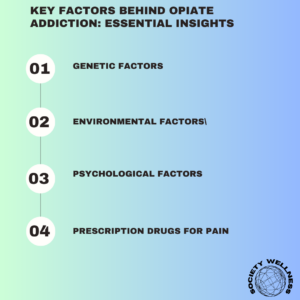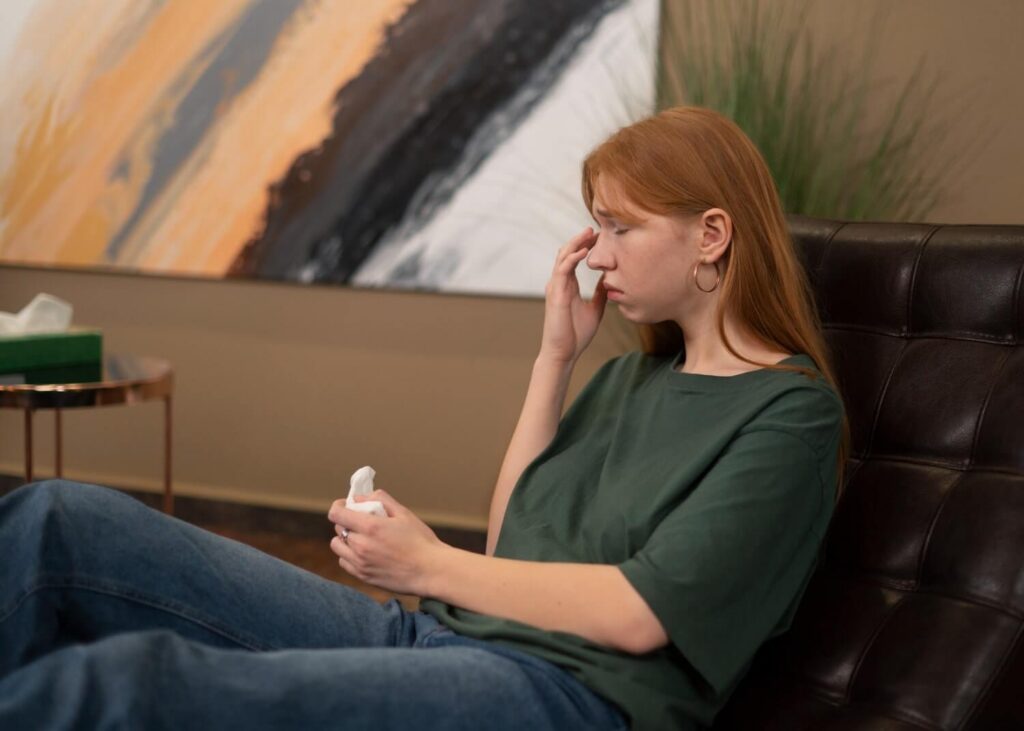Opiate addiction is a serious public health issue that affects millions of people globally. Opioids are a class of pharmaceuticals produced from the opium poppy that has been used for both medical and recreational purposes.
These drugs include heroin and prescription painkillers like oxycodone, hydrocodone, and morphine. To address and lessen the effects of opiate addiction on people and communities, it is crucial to learn the complex nature of this addiction. In this blog post, we will uncover the causes, symptoms, and treatment options of Opiates. So, let’s jump in!
Opiate Addiction Causes- Important Check!
1. Genetic Factors
A family history of substance misuse may make a person more prone to developing an opiate addiction because of hereditary features that alter behavior and brain chemistry.

2. Environmental Factors
Addiction risk can be raised by exposure to settings where drug use is common, such as high-stress workplaces or specific social groups.
3. Psychological Factors
Substance misuse and mental health conditions including PTSD, anxiety, and depression frequently coexist. Opioids can be used by people as a kind of self-medication and psychological relief, but this can quickly result in dependency.
4. Prescription Drugs for Pain
Opioids are frequently used to treat pain after surgery or trauma. Although these drugs are useful for treating pain temporarily, they have a high potential for addiction.
Opiate Symptoms: Are you observing the same?
To identify whether you are addicted to opiates, check the below signs:
- Frequently switching buddies.
- Rejecting socializing with family and friends in favor of alone time.
- Losing enthusiasm for activities.
- Avoid taking a shower, getting dressed, or brushing their teeth.
- Feeling depressed and exhausted.
- Eating in excess or insufficiently.
- Being extremely animated, speaking quickly, and making nonsensical statements
- Being tense or irritable.
- Abrupt mood swings.
- Sleeping at strange times.
- Skipping crucial appointments.
- Finding yourself in legal hot water Attending a job or school irregularly.
- Having trouble making ends meet.
What Treatment Options are Available for Opiate Addiction?
Now, that you have understood what symptoms and causes are associated with Opiate addiction. It’s time to learn the treatment options available to you.
Medical Detoxification
The initial phase of treating opiate addiction is detoxification, which is a medically monitored taper off of the medication. This procedure aids in the management of withdrawal symptoms and gets patients ready for additional care.
Treatment with Medication Assistance (MAT)
MAT mixes behavioral therapy and counseling with drugs like methadone, buprenorphine, or naltrexone. These drugs promote long-term recovery by lowering cravings and withdrawal symptoms.
Behavioral Therapies
- Cognitive behavioral therapy (CBT): Assists people in identifying and altering harmful drug-related cognitive patterns and behaviors.
- Contingency Management: Promotes sobriety and treatment program participation through the use of positive reinforcement.
- Motivational interviewing: Increases a person’s desire to make changes and dedicate themselves to the healing process.
Support Teams
Peer support organizations, such as Narcotics Anonymous (NA), offer a community of people who have gone through similar things and offer accountability and support to one another. These LGBTQ Addiction Programs and support groups may be an important part of long-term rehabilitation.
Outpatient and Inpatient Treatment Plans
Outpatient programs give patients the freedom to receive treatment while still attending to their daily obligations. Impatient programs offer comprehensive, round-the-clock care in a residential setting. Depending on the demands of the individual and the severity of the addiction, both strategies may be beneficial.
Join an Intensive Outpatient Program to Get Rid of Addiction
If you are looking for the best rehab center to get rid of Opiate Addiction faster, then call Society Wellness. We are aware that no two persons have the same experiences with mental health and drug use problems. Thus, we provide a continuum of care in order to meet your unique requirements and objectives.
We offer a range of service levels, from outpatient therapy for individuals striving to sustain progress to partial hospitalization for those requiring acute support. To find out which program is best for you, contact us right now.
FAQs on Opiates and Opioid Addiction
What is the difference between opiates and opioids?
Opiates are naturally occurring substances derived from the opium poppy, while opioids include both natural and synthetic substances.
How do opioids work in the brain?
Opioids bind to opioid receptors in the brain, producing pain relief and euphoria. Over time, the brain adapts, leading to tolerance and dependence.
What are some common opioids?
Common opioids include heroin, morphine, oxycodone, hydrocodone, and fentanyl.
What are the signs of opioid addiction?
Signs include intense cravings, withdrawal symptoms, neglect of responsibilities, and continued use despite negative consequences.
Can opioid addiction lead to overdose?
Yes, opioid overdose is a serious and potentially fatal consequence of opioid addiction.
What are the symptoms of opioid withdrawal?
Withdrawal symptoms can include muscle aches, sweating, nausea, vomiting, diarrhea, and intense cravings.
Begin your journey to recovery and wellness with us today.
If you or a loved one is battling opiate addiction, LGBTQ Addiction Centers is here to support you every step of the way. Opiate addiction can be overwhelming, but recovery is possible with the right help. Our dedicated team understands the complexities of opiate addiction and is ready to provide personalized care tailored to your needs. At LGBTQ Addiction Centers, you’ll find more than just a treatment program – you’ll find a community that cares about your recovery and your future. Let us help you overcome addiction and reclaim your life. Call us at (888) 598-9510 today or reach out online.
